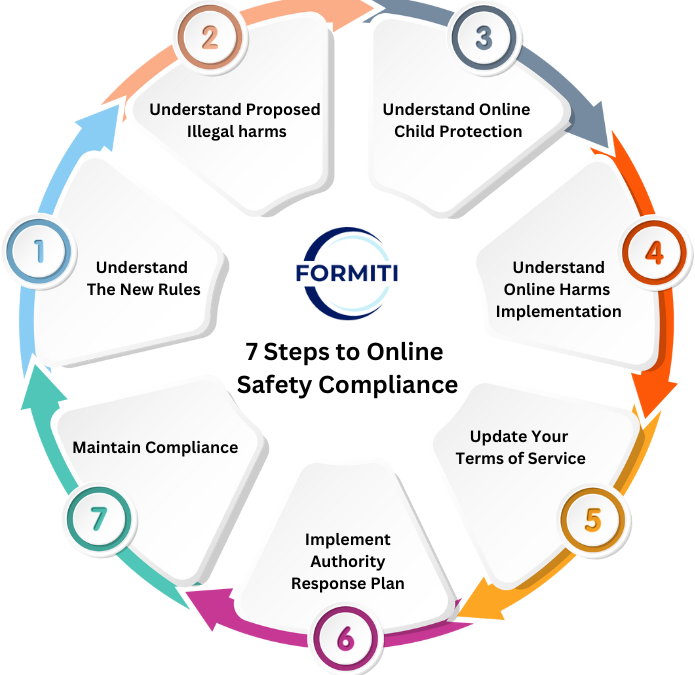Introduction
As the UK Online Safety Act which came into effect in 2023, meant that online service providers operating in the UK market had to take proactive steps to ensure compliance with this significant piece of legislation. The Act is designed to protect users, particularly children, from online harms and to hold service providers accountable for the content shared on their platforms. Below, we explore the key elements of the Act and provide practical advice for online service providers.
1: Understand the New Rules Within the Act
The UK Online Safety Act introduces a new legal framework aimed at making the internet a safer place. It imposes duties on online service providers to prevent the spread of illegal content and to protect users from harm. Providers are required to conduct risk assessments, implement appropriate safeguards, and cooperate with regulatory authorities. Key obligations include:
- Duty of Care: Providers must take reasonable steps to prevent users from encountering illegal content and to protect them from harmful material.
- Transparency Reporting: Regular reporting to Ofcom (the regulator) on how risks are being managed and mitigated is mandatory.
- Content Moderation: Robust systems must be in place to identify, remove, and prevent the reappearance of illegal content.
Understanding these rules is essential for online service providers to adapt their policies and procedures accordingly.
2: Understand Proposed Illegal Harms
The Act defines several categories of “illegal harms” that online service providers must address. These include:
- Terrorism Content: Material that promotes or glorifies terrorism.
- Child Sexual Exploitation and Abuse (CSEA): Content that depicts or encourages sexual abuse of minors.
- Hate Speech: Communications that incite violence or hatred against individuals based on race, religion, gender, or other protected characteristics.
- Fraudulent Activity: Content that is deliberately misleading or used to perpetrate fraud.
Providers must implement robust detection and removal mechanisms for these types of content and ensure that their platforms do not facilitate the spread of such harms.
3: Understand Online Child Protection
One of the central tenets of the UK Online Safety Act is the protection of children. The Act mandates that online service providers take proactive measures to safeguard children from exposure to harmful content. This includes:
- Age Verification: Implementing reliable age verification mechanisms to prevent underage access to inappropriate content.
- Content Filtering: Providing tools that allow parents and guardians to control the type of content children can access.
- Education and Awareness: Educating young users about online safety and the risks they may encounter.
Providers must ensure that their platforms are designed with child safety in mind and that these protections are consistently applied.
4: Understand Authority Online Harms Implementation
Ofcom, the UK’s communications regulator, has been given significant powers under the Act to enforce compliance. Online service providers must be prepared for:
- Audits and Inspections: Ofcom has the authority to conduct regular audits of service providers’ practices and procedures.
- Penalties for Non-Compliance: Providers that fail to meet their obligations under the Act may face substantial fines or even be banned from operating in the UK.
- Content Removal Notices: Ofcom can issue notices requiring the removal of specific content within a set timeframe.
Understanding Ofcom’s role and how it will implement the Act is crucial for online service providers to avoid regulatory action.
5: Update Your Terms of Service
In preparation for the UK Online Safety Act, online service providers must review and update their terms of service to reflect the new legal obligations. Key updates should include:
- Clear Prohibited Content Policies: Explicitly outline what constitutes illegal and harmful content on your platform.
- User Responsibilities: Define the responsibilities of users in reporting harmful content and adhering to community standards.
- Consequences of Breaches: Clearly state the actions that will be taken against users who violate these policies, including suspension or banning from the platform.
These updates will not only ensure compliance but also provide transparency to users about their rights and obligations.
6: Implement an Authority Request Response Plan
To comply with the UK Online Safety Act, online service providers must be ready to respond promptly to requests from authorities, such as content removal notices or information requests. A robust response plan should include:
- Designated Compliance Officers: Assign individuals within your organisation to handle communications with regulatory authorities.
- Standard Operating Procedures: Develop clear procedures for responding to requests, including timelines and documentation requirements.
- Training and Awareness: Ensure that all relevant staff are trained on how to manage authority requests in line with the Act.
Having a well-defined response plan in place will enable your organisation to act quickly and effectively when required.
7: Maintain Compliance with a Continuous Improvement Plan
Compliance with the UK Online Safety Act is not a one-time effort but requires continuous monitoring and improvement. Online service providers should:
- Regularly Review Risk Assessments: Continuously assess the risks posed by the content on your platform and update your safeguards accordingly.
- Stay Informed of Regulatory Changes: Keep abreast of any updates or amendments to the Act and adjust your compliance strategies as needed.
- Engage with Industry Best Practices: Participate in industry forums and initiatives to share knowledge and improve your compliance efforts.
By maintaining a continuous improvement plan, you can ensure that your organisation remains compliant with the Act and adapts to any future regulatory changes.
Conclusion
The UK Online Safety Act represents a significant shift in how online service providers must operate within the UK market. Compliance with this Act will require a thorough understanding of its provisions, proactive measures to protect users from harm, and ongoing efforts to stay ahead of regulatory requirements.
At Formiti Data Protection and Privacy Services, we specialise in helping organisations navigate complex regulatory landscapes. Our team of experts can assist you in achieving and maintaining compliance with the UK Online Safety Act, ensuring that your business is prepared for the challenges ahead. Whether you need support with risk assessments, updating your terms of service, or developing a continuous improvement plan, Formiti is here to help.

